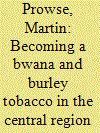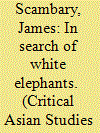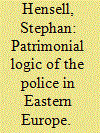| Srl | Item |
| 1 |
ID:
092174


|
|
|
|
|
| Publication |
2009.
|
| Summary/Abstract |
Smallholders now grow most of Malawi's main export crop - burley tobacco. Based on nineteen months' fieldwork in the Central Region, this article offers a sociological interpretation of why some smallholder growers spend a proportion of burley income on conspicuous consumption in rural towns and trading centres. This practice can be seen as a form of inculcated behaviour whereby smallholders reproduce elements of one model of success in this region: that of the Malawian tobacco bwana (boss/master). The article discusses implications from this form of potlatch behaviour by describing the contrasting fortunes of two non-farm rural enterprises, examining data on how tobacco production and 'cooling off' is viewed by wives, and comparing the crop preferences of husbands and wives. It concludes by suggesting that the concept of conspicuous consumption may provide an alternative prism to the instrumental lens of neo-patrimonialism through which to view apparently unintelligible investment decisions in African economies.
|
|
|
|
|
|
|
|
|
|
|
|
|
|
|
|
| 2 |
ID:
139439


|
|
|
|
|
| Summary/Abstract |
A little more than a decade after independence, the small island state of East Timor is exhibiting the hallmarks of a neo-patrimonialist state. Since 2008, utilizing its considerable oil reserves, the government has embarked on a major infrastructure development program. However, despite a complex regulatory regime to safeguard the quality and transparency of spending, these systems have been routinely bypassed by executive-style decision making and a variety of informal and sub-legal devices. Public funds have been channeled to clientelist networks via often controversial infrastructure projects or state employment. This article details the emergence of this state and explains how a command style of government and complex systems of reciprocal obligation embedded in an array of parallel, informal networks have undermined the foundations of a Weberian rational-legal state, with critical consequences for development and stability.
|
|
|
|
|
|
|
|
|
|
|
|
|
|
|
|
| 3 |
ID:
114172


|
|
|
|
|
| Publication |
2012.
|
| Summary/Abstract |
The police in Eastern Europe are often regarded as politicised, poorly trained and corrupt. This article argues that the police follow a patrimonial logic. Neo-patrimonialism is mostly understood as an authoritarian regime with a personal ruler at the top. By contrast, here a concept will be suggested which reformulates patrimonialism as the practice of the acquisition of offices and material resources. Based on this, two case studies analyse the police administration in Albania and Georgia. The findings suggest that patrimonial practices play a central role in the recruiting and financing of law enforcement officers. The result is a hybrid administration, which is significantly subject to special interests.
|
|
|
|
|
|
|
|
|
|
|
|
|
|
|
|